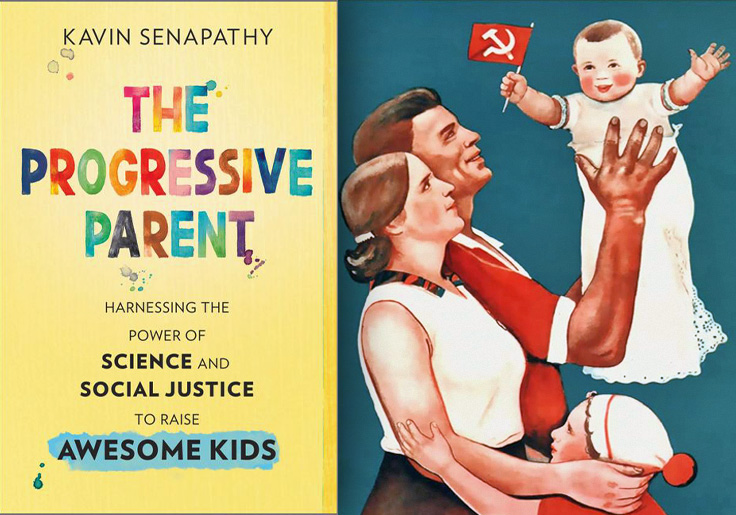How To Raise an Anti-American

“This is not primarily an anti-capitalist book,” journalist Kavin Senapathy (she/they) explains in the opening chapter of The Progressive Parent: Harnessing the Power of Science and Social Justice to Raise Awesome Kids. She’s right in the sense that “their” book is not primarily about anything, least of all raising children. It is a rambling anti-American screed reflecting the myriad familiar grievances of progressive elites, steeped in the fatuous academic jargon of the overeducated. (Senapathy was raised and currently resides in the liberal college-town bubble of Madison, Wisconsin.)
Consider the following sentences, of many similar examples, that appear in this “parenting” guide:
• “America as we know it—and its legacies of genocide, slavery, capitalism, the prison-industrial complex, institutionalized Islamophobia, and other forms of oppression—was forged in the fires of racism.”
• “Whiteness, cisnormativity, and heteronormativity aren’t the only dehumanizing defaults or control groups that have upheld a deleterious standard. Across society, ableism …”
• “The tissue that is separated and layered behind the labia instead wraps and closes the urethra to form the penile shaft in people considered to be males.”
These helpful tips appear alongside exceedingly detailed scientific explanations of conception, sickle cell disease, and human evolution since the dawn of Homo sapiens in Africa (things every new parent should know).
The Progressive Parent has more in common with Unshrinking, a book ostensibly about the dangers of “fatphobia” by Kate Manne, associate professor of feminist philosophy at Cornell University, than it does with any actual parenting guide. Unshrinking (reviewed here) was similarly bogged down with extended rants about “vested capitalist interests” and the evils of “racism, misogyny, ableism, transphobia, etc.” The prevailing doctrine of “intersectionality” apparently prohibits these nerds from writing on any topic without denouncing all the bad things and apologizing for not writing from the perspective of a black trans woman.
The book is based on interviews with dozens of so-called experts and impressively credentialed academics—professors and students alike—whose elaborate résumés would be dismissed as overly farcical or on-the-nose if presented as satire. Here are a few (of many) examples:
• “Florence Ashley, a transfeminine jurist, bioethicist, and doctoral candidate at the University of Toronto.”
• “Victor Lopez-Carmen (known as Waokiya Mani in the Dakota language and Machil in the Yaqui language), a Harvard Medical School student set to graduate in 2024, cochair of the UN Indigenous Youth Caucus.”
• “Brian Donovan, a senior science researcher at the Humane Genetics Research Lab at the nonprofit BSCS Science Learning … [which] explores how biology education, especially in middle school and high school, can tackle racism and sexism in society.”
• “Rachel Hardeman, PhD, MPH, a reproductive-health equity researcher at the University of Minnesota, whose research elucidates the role of racism on health for birthing people and their babies.”
• “Maha Hilal, PhD, a researcher and organizer dedicated to dismantling the War on Terror and author of Innocent Until Proven Muslim.”
• “Imani Barbarin, a disability-rights advocate who writes from the perspective of a Black woman with cerebral palsy.”
• “Dr. Ayesha Khan, an infectious disease scientist, grassroots organizer, writer, astrobiologist, and … the creator of ‘abolitionist science,’ which takes a scientific approach to abolish systems of oppression.”
The book’s contents are similarly beyond parody. The margins of your humble reviewer’s copy are littered with variations of “WTF” and “OMFG” and “YGTBFKM.” For example, Senapathy warns parents to avoid asking children what they want to be when they grow up because “the very idea of productivity, concerted ambition, and hard work as universal ideals” is actually “a ploy of capitalism and the police state” that “justifies oppression.” She feels “increasingly uneasy” about the non-inclusive language surrounding a “woman’s right to choose.”
The author’s views are well outside the mainstream, even in the context of deranged progressive elites. “Personally, I agree with the growing yet still-unpopular stance that sex-segregated sports don’t make sense,” Senapathy writes, insanely. “The notion that segregating the sexes in sports is done because males are bigger, stronger, and faster than females is based on mythology.” She cites figure skating as an example.
The absurdity is exacerbated by contradictions. After urging target readers—wealthy white progressives who feel guilty about sending their kids to private school—to reject performative virtue-signaling, Senapathy acknowledges writing the book on “ancestral Ho-Chunk land” stolen by white colonizers. “I recognize and honor their legacy and resilience,” she writes, performatively. In any event, the author goes on to explain that it’s wrong to judge people for virtue-signaling—wearing a “Protect Trans Kids” T-shirt, for example—because it’s “ableist” to expect someone to do more.
Whereas most people can probably agree that teaching their children to be kind is one of the most basic things parents should do, Senapathy suggests the issue is far more complicated. “Benevolence and friendliness are wonderful things but can do a disservice when applied indiscriminately,” she argues. “Often, doing the right thing means upsetting some people.” This means having the courage to “write the email” to call out racism or push back against “colorblind ideology,” but resisting the urge to complain that plastic straws are destroying the environment. That’s “eco-ableism.”
This is not a book that radiates joy, let alone hope or a semblance of belief in the American Dream. If anything, Senapathy sounds more like a certain former president who in her view embodies all the bad things. “Life is rough for a lot of families,” she writes. “The future seems pretty bleak.” So, what can we do about it? Vote for Democrats, obviously. Other than that? Not much.
Senapathy argues that being a “progressive parent” has less to do with individual choices than it does with dismantling systems of oppression that perpetuate injustice. So while it is important to admonish your children for using ableist terms such as “dumb” and “crazy,” it is far more meaningful to “vote against bigoted legislation” and support radical left-wing policies such as reparations—for slavery, climate change, Native American genocide, and so on. It means trusting “credible medical professionals and progressive school districts” to know what’s best for our children, especially when it comes to withholding information from “unsupportive” parents.
Notwithstanding the nonsense, the author actually makes some compelling points—however inadvertently—about trust and skepticism, particularly when it comes to so-called scientific experts. Senapathy urges readers to maintain a “healthy scrutiny” of these experts, whose consensus views have often turned out to be wrong and whose findings are often clouded by ideology and bias. (She means racism and capitalism, obviously, but the general point is still valid.) “Continue to interrogate your worldviews,” she writes. “Actively don a fresh lens.”
It’s good advice for everyone, including new parents, but particularly for the elite progressive experts, quoted liberally in the book, who are the least likely to take it.
The Progressive Parent: Harnessing the Power of Science and Social Justice to Raise Awesome Kids
by Kavin Senapathy
Hanover Square Press, 320 pp., $28.99




